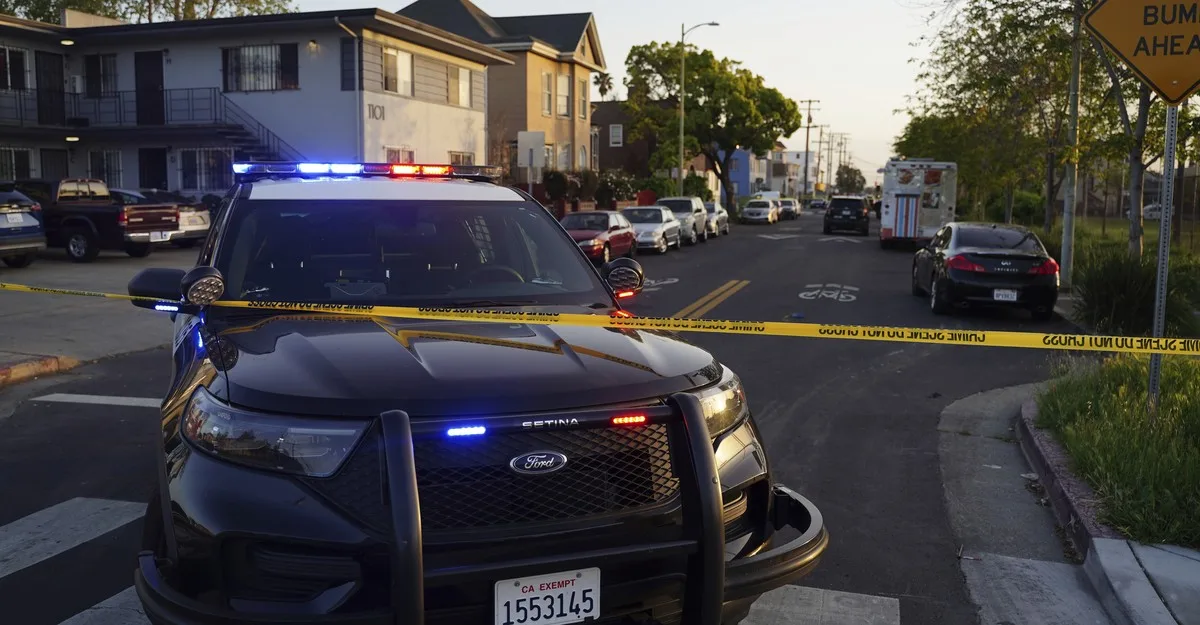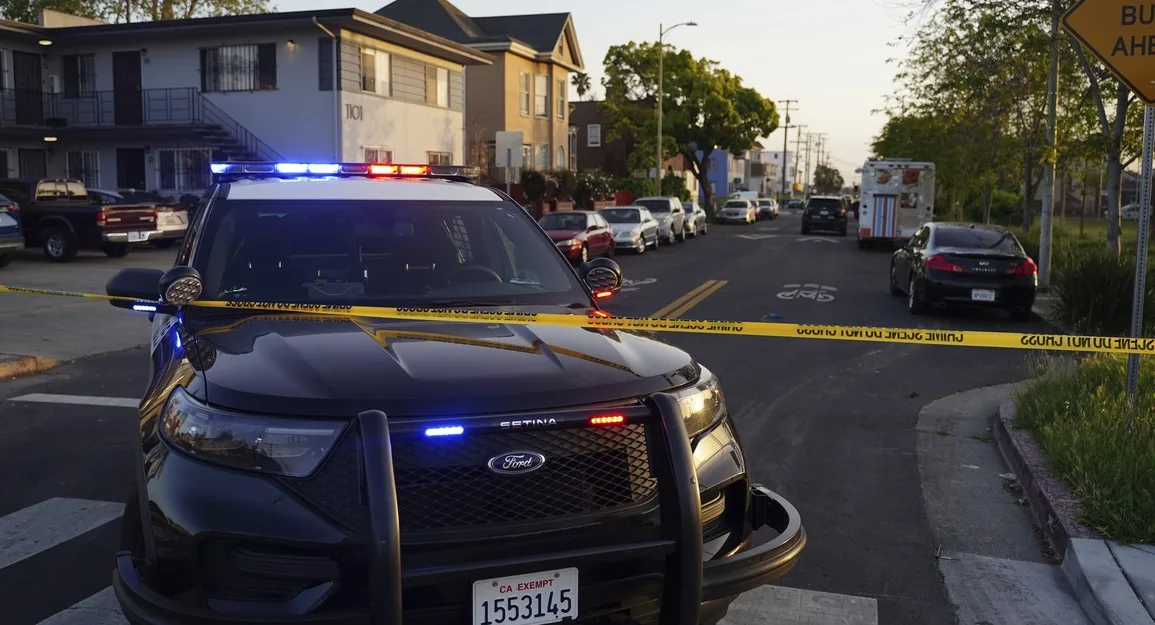
Welcome to Up for Debate. Each week, Conor Friedersdorf rounds up timely conversations and solicits reader responses to one thought-provoking question. Later, he publishes some thoughtful replies. Sign up for the newsletter here.
Question of the Week
Donald Trump is guilty of deplorable actions, under indictment for multiple crimes, and yet remains the most popular candidate with voters in the Republican Party’s presidential primary.
Why do you think he is still their first choice?
Send your responses to conor@theatlantic.com.
Conversations of Note
The prevailing public conversation about crime has been upended in one of the most progressive enclaves in America, where a storied civil-rights organization has had enough. In Oakland, California, the local branch of the NAACP released a scathing open letter on crime last week that purports to capture the frustrations of a community where many now live in fear.
Cynthia Adams, president of the Oakland NAACP, and Bishop Bob Jackson, a local pastor, are listed as the letter’s authors. It begins:
Oakland residents are sick and tired of our intolerable public safety crisis that overwhelmingly impacts minority communities. Murders, shootings, violent armed robberies, home invasions, car break-ins, sideshows, and highway shootouts have become a pervasive fixture of life in Oakland. We call on all elected leaders to unite and declare a state of emergency and bring together massive resources to address our public safety crisis.
African Americans are disproportionately hit the hardest by crime in East Oakland and other parts of the city. But residents from all parts of the city report that they do not feel safe. Women are targeted by young mobs and viciously beaten and robbed in downtown and uptown neighborhoods. Asians are assaulted in Chinatown. Street vendors are robbed in Fruitvale. News crews have their cameras stolen while they report on crime. PG&E workers are robbed and now require private security when they are out working.
Everyone is in danger.
The letter proceeds to lay blame for the crisis on local leadership and their progressive policies, stating:
Failed leadership, including the movement to defund the police, our District Attorney’s unwillingness to charge and prosecute people who murder and commit life threatening serious crimes, and the proliferation of anti-police rhetoric have created a heyday for Oakland criminals. If there are no consequences for committing crime in Oakland, crime will continue to soar.
People are moving out of Oakland in droves. They are afraid to venture out of their homes to go to work, shop, or dine in Oakland and this is destroying economic activity. Businesses, small and large, struggle and close, tax revenues vanish, and we are creating the notorious doom-loop where life in our city continues to spiral downward. As economic pain increases, the conditions that help create crime and criminals are exacerbated by desperate people with no employment opportunities.
We are in crisis and elected leaders must declare a state of emergency and bring resources together from the city, the county, and the state to end the crisis. We are 500 police officers short of the number that experts say Oakland needs. Our 911 system does not work. Residents now know that help will not come when danger confronts them. Worse, criminals know that too.
The authors call for a multiracial anti-crime coalition, and imply that would-be members of such a coalition have been too intimidated to form one:
We urge African Americans to speak out and demand improved public safety. We also encourage Oakland’s White, Asian, and Latino communities to speak out against crime and stop allowing themselves to be shamed into silence. There is nothing compassionate or progressive about allowing criminal behavior to fester and rob Oakland residents of their basic rights to public safety. It is not racist or unkind to want to be safe from crime.
And it advocates for social programs and economic development to address root causes of crime:
Our youth must be given alternatives to the crippling desperation that leads to crime, drugs, and prison. They need quality education, mentorship, and, most importantly, real economic opportunities. Oakland should focus on creating skilled industrial and logistics jobs that pay family sustaining wages, and vocational training so Oakland residents can perform those jobs. With this focus we can produce hundreds, if not thousands, of the types of jobs desperately needed to stem economic despair. Unfortunately, progressive policies and failed leadership have chased away or delayed significant blue collar job development in the city, the Port of Oakland, and the former Army Base. That must change! We also must continue with mentoring programs like the Oakland branch of the national OK Program that steers youth away from criminal activity. We believe that young people currently in the criminal life will choose another path if they are shown a way.
In response to the letter, the Alameda County District Attorney’s Office released the following statement to local media outlets: “We are disappointed that a great African-American pastor and a great African-American organization would take a false narrative on such an important matter. We would expect more from Bishop Bob Jackson and the Oakland Chapter of the NAACP.”
Commenting on the NAACP’s letter, the civil libertarian criminal-defense attorney Scott H. Greenfield argued at his blog, Simple Justice, “There is nothing inconsistent about wanting better cops, who treat citizens respectfully, don’t violate their constitutional rights and don’t resort to needless violence, and wanting police to do the job of protecting citizens.” He continued:
Nobody wants to be wrongfully beaten by a cop. Nobody wants to be beaten by a vicious criminal either. Nobody wants people who are inclined to commit crimes, whether because economic circumstances aren’t as wonderful as Bidenomics tells them or just because committing crimes is a quicker path to getting what they want than working for it, to believe they can do so with impunity … When people on the street live in fear of crime, their lives are miserable and their participation in society limited. They don’t want to live that way, and the Oakland NAACP has stood up to speak for its constituency. This doesn’t make them cop lovers or reform haters, but human beings trying to survive together. Cops are part of that survival, and to accept this does not mean that cops can’t, and shouldn’t, do a whole lot better than they have in the past.
The Boston Globe columnist Jeff Jacoby writes:
Each year, tens of thousands of Oakland residents are victimized in criminal attacks. Preventing shoplifting, car jackings, armed robberies, and homicides is not a conservative or a liberal goal. It is why governments exist in the first place.
The Road Not Taken
At Notes From the Middleground, Damon Linker is considering the newest indictment of Donald Trump with trepidation for the future and frustration about a key moment in the recent past:
Short of an intervening (possibly stress-induced) medical event, Trump is going to be the Republican nominee for president. He will be running for the nation’s highest office while on trial for multiple crimes in multiple jurisdictions. His campaign will take direct aim at the rule of law, declaring it a sham fit only for saps, suckers, and chumps, and most Republican voters will fall in line with this sordid civic lesson, just as most Republican voters have come to believe the 2020 election was stolen by the Democrats simply because Trump has said it was.
Trump could well be convicted in one or more of these trials before Election Day 2024. And he could well win the election, sending him to the White House instead of federal prison. Far from vindicating the rule of law, such an outcome would make a mockery of it.
And what if he loses, claiming once again to have been robbed of a victory by a vast conspiracy involving the Democratic Party, prosecutors and the courts, ostensibly neutral government functionaries, and the “fake news” media that will stop at nothing to deny power to the nearly half of the country that dares to resist left-wing totalitarian control? I won’t try to answer that question. Your imaginations can do the work all on their own.
I’ll leave you with something else instead—my growing conviction is that the last opportunity we had to contain and partially neutralize the civically pestilential influence of Donald Trump on our polity was February 13, 2021. That’s the day Senate Minority Leader Mitch McConnell voted to acquit Donald Trump for his actions on and leading up to the events of January 6. While describing Trump’s words and deeds in the run-up to the insurrectionary violence on Capitol Hill as “disgraceful,” McConnell nonetheless preferred to let the judicial branch of government solve his Trump problem for him, declaring, “We have a criminal justice system in this country. We have civil litigation. And former presidents are not immune from being held accountable by either one.”
In the annals of shirked political responsibility, that has to deserve a special prize. It would have taken ten more votes in the Senate to convict Trump in his second impeachment. Had McConnell taken a public stand against the former president and whipped others in his party to do the same, Trump might have been barred from ever holding public office again. That would have been a political solution to what was and remains a fundamentally political problem. Instead, we’re left with the legal solution McConnell preferred—and the considerable risk that politics may well overwhelm and devour it.
In Hot Water
In The Atlantic, Marina Koren argues that rising sea temperatures are especially troubling:
Earth is an ocean planet, a water world. We have not observed anything like it yet in the universe, not even with our best telescopes, and so we cannot know exactly how rare—and thus, how difficult—it may be for the forces of cosmic nature to produce such a thing. And yet, here we are, simmering its oceans at our peril and changing the fundamental makeup of the ecosystem that defines Earth. Our oceans have absorbed most of the excess heat produced by greenhouse-gas emissions in recent decades, serving as a buffer that protects us from the worst effects of climate change. Humans may be sweltering on land this summer, but our planet’s future—and therefore ours—is intimately tied with the sea.
Provocation of the Week
Writing at Law & Liberty, Yuval Levin explores the relationship between America’s constitutional design and our efforts to live together across differences.
Acting together when we don’t think alike requires creating some space for competing approaches to governance; compelling opposing factions to bargain, negotiate, and seek accommodations that not only avert conflict but bring us closer together; administering the government in steady, predictable ways in accordance with those accommodations; and enforcing clear boundaries on the power of majorities and public officials. This is the work of federalism, Congress, the president, and the courts, respectively. But it all requires a citizenry well formed in core republican virtues by the very experience of working together even when we don’t think alike.
This is a fact we often miss about our Constitution. It works by setting competing interests and powers against each other, which critics sometimes caricature as substituting an almost mechanical proceduralism for morally substantive civic formation. But that is precisely wrong. This approach actually begins from the insight that, in order to be properly formative, our politics must always be in motion—that moral formation is a matter of establishing habits, and that civic habits are built up by civic action more than by a proper arrangement of rules. The different interests, priorities, and power centers set against each other in our system do not rest against each other, like interlocking beams holding up a roof. Rather, they push, pull, and tug at each other and unceasingly compete for position. They are living political actors, not inanimate structural supports. And none can achieve anything without dealing with the others, who are always in their way. The result is a peculiar style of politics, which feels frustrating and acrimonious at almost any given instant, but can be remarkably dynamic in the long run.
Thanks for your contributions. I read every one that you send. By submitting an email, you’ve agreed to let us use it—in part or in full—in the newsletter and on our website. Published feedback may include a writer’s full name, city, and state, unless otherwise requested in your initial note, and may be edited for length and clarity.



